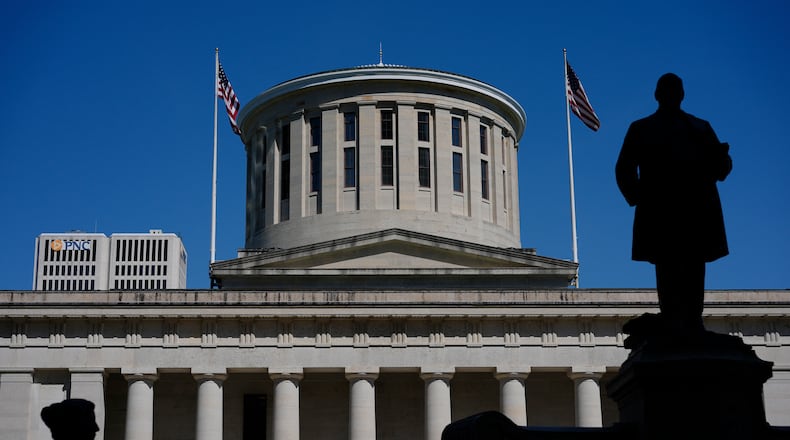“There’s a couple people who are going to vote no, there’s at least one who said she is unavailable, I think we have 58ish committed yeses and some people who are undecided who want to talk this weekend,” he said and later added: “I think if everybody shows up who can show up, who hasn’t said they’re going to vote no, we have 61 or 62 votes.”
The most notable “no” vote is former Republican House speaker Rep. Jason Stephens from Lawrence County. He told this news outlet he won’t be in the Monday session because the measures the House plans to override really don’t impact his district and aren’t “worthy” of an override.
“I just don’t see the urgency,” he said.
He said when the legislature returns in September they should consider other reforms that have already been proposed, like those supported by the county auditors association. However he believes more state subsidies — roughly 10% of the state budget goes to augment local property taxes — aren’t the answer.
“I honestly don’t think it’s fair for people in my district to pay income taxes to the state to then subsidize a community that has voted for tax levies that are three times higher than the levies we voted for,” he said. “Why should people in my district’s income taxes go to subsidize someone’s property taxes in another district for their fire department. They made the decision to vote for that levy, they get to pay the bill for that levy.”
DeWine vetoes
Gov. Mike DeWine exercised his power to veto pieces of the $60 billion biennium budget — 67 provisions in all — he dislikes three weeks ago, axing nearly all of the property tax reforms the House and Senate approved in the new two-year spending plan. He said they were harmful to the schools and children.
He explained his line-item vetoes.
“I line-item vetoed several provisions related to property taxes, I felt these ideas were thoughtful but I also was concerned that imposing them now, all of them at once, on our local schools would create a huge, huge problem,” he said. “And none of them guaranteed what we would end up with.”
He also announced the formation of another work group he is convening to study the problem and gave them until Sept. 30 to submit “meaningful” solutions.
The House will be voting to override three of the four property tax measures DeWine vetoed. They are:
- Adjusting the school district 20-mill floor calculation to include emergency, substitute and other levies and income taxes.
- Giving county budget commissions the authority to “unilaterally” reduce a levy passed by voters if they determine the funding isn’t necessary.
- Eliminate replacement tax levies for all taxing bodies and curtail school districts’ ability to levy fixed-sum emergency and substitute emergency levies and school district income tax and fixed-sum property tax levies.
DeWine also axed a provision that would limit school district carryover to 40% of their expenses and require excess funds be refunded to taxpayers. An estimated $2.5 billion savings to taxpayers, though it was fiercely opposed by school leaders. House lawmakers aren’t trying to restore that one.
“There were folks who said they’ve got this money, we don’t want them to have to give it back,” Huffman said. “It was the thing I think school districts were complaining the most about. So I just decided we’re not going to fight that more difficult battle.”
DeWine didn’t touch the measure that allows county commissioners to authorize their own “piggyback” Homestead exemptions and 2.5% owner-occupied tax rollback. The state reimburses the various taxing bodies for these tax breaks, but if the counties want to double the benefit it would come out of local revenues.
‘Moderate provisions’
Huffman said he is puzzled that DeWine took his veto pen to the property tax reforms because they weren’t radical ideas. Some in the caucus were pushing for the controversial proposal to erase or reduce inside millage, which is unvoted millage that helps fund local governments.
“These were really just the more moderate provisions, they weren’t the far right ones. That’s why this is so stunning that the governor (did this), we did the things that no one complained about, the governor didn’t call me or anybody in our caucus and say we shouldn’t do this,” Huffman said. “My biggest concern frankly is if these overrides don’t go forward the folks that are passing this petition next year will fairly be able to say (lawmakers are) not going to do anything.”
As a result of the legislature’s inability to pass meaningful tax reform, the Committee to Eliminate Property Taxes, has been gathering petition signatures to get a constitutional amendment to eliminate property taxes altogether on a statewide ballot. They missed the deadline for the November ballot — they’ve only been collecting since mid-May and need 413,487 valid signatures — but they aren’t quitting.
Huffman said if the override fails there will be no relief for taxpayers when they see their bills next year. Anything they can get done after the summer break won’t make an impact until the following year, but they’ll continue to try.
“It’s not finished, it’s an ongoing process but I think you have to understand the governing reality, we have a governor who is not as interested in property tax relief as the General Assembly is,” Huffman said. “In the House we’re going to continue to prosecute these various provisions and we move on.”
If the House successfully overrides the vetoes, the Senate must concur with 20 votes. Senate Finance Committee Chair Jerry Cirino, R-Kirtland, who co-chaired the conference committee that hammered out the budget differences between the two legislative chambers, said there will be a vote.
“We are planning on getting back together for sure,” he said. “It’s just a question of picking the right date when everybody can be here.”
About the Author
